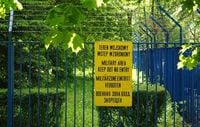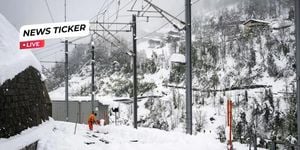In a significant move to bolster national security, the Polish government has enacted a ban on photographing critical infrastructure, a regulation that has sparked considerable debate over its implications. Effective from April 17, 2025, this law encompasses not only military installations but also a wide array of civilian structures deemed vital to the nation's functioning.
General Wiesław Kukuła, head of the General Staff of the Polish Army, articulated the necessity of this regulation, stating that the information and images obtained by foreign operatives pose a serious threat. "We find photographic information regarding the location of our troops and military units on various types of detainees," Kukuła noted, emphasizing the urgency of the situation in light of ongoing conflicts, particularly the war in Ukraine.
The newly introduced symbol will be affixed to various sites, indicating they are protected and cannot be photographed without incurring penalties. These penalties will be classified as offenses, primarily aimed at deterring foreign intelligence activities. Kukuła reiterated, "This is not about penalizing ordinary citizens; rather, it is a tool aimed at foreign services," highlighting the law's focus on national security.
Critical infrastructure, as defined by the government, includes not only military facilities but also essential civilian structures such as airports, train stations, bridges, tunnels, communication facilities, hospitals, and even financial institutions like the National Bank of Poland. The breadth of this definition raises questions about how far the restrictions will extend.
In a related report by journalists from "Czarno na Białym" on TVN24, a disturbing incident was revealed where 20 trains were halted across Poland, with machinists hearing the Russian anthem in their cabins. This incident has underscored the importance of safeguarding critical infrastructure from potential threats.
General Bogusław Pacek, director of the Polish Army Museum, added that understanding the layout and security of critical infrastructure is crucial amid the ongoing war in Ukraine. He stated, "This war demonstrates how essential knowledge about critical infrastructure is to our national security." The implications of such knowledge could be far-reaching, affecting not only military strategies but also civilian safety.
As the law comes into effect, drivers entering military bases will be required to turn off video recorders to comply with the new regulations. Kukuła remarked, "It is hard to imagine that we wouldn’t consider a gas port and other critical elements essential for the state’s functioning as infrastructure." This statement illustrates the expansive nature of what the government considers critical infrastructure.
Concerns have been raised by Piotr Zakrzewski from the Ombudsman’s Office regarding the potential for abuse of this law. He warned that political decisions could lead to any building, including the Presidential Palace and the Prime Minister's Office, being subjected to the ban. Zakrzewski argued that this could infringe upon the constitutional right to information, stating, "If someone accidentally records such a building, even with a drone, it could also constitute an offense." He further noted, "I do not think that the Presidential Palace will be covered by such a ban," reflecting a cautious optimism about the law's application.
Piotr Zalewski, Deputy Minister of National Defense from the Poland 2050-Third Way party, elaborated on the broader implications of the ban, asserting that foreign intelligence services are interested not only in buildings but also in the people within them. "This is a matter of security; we should not take it lightly," he insisted, reinforcing the idea that the law aims to enhance national resilience.
Military officials assert that the primary goal of the new law is to raise awareness of potential threats and foster a culture of responsibility regarding national security. Kukuła stressed that the focus is on building resilience rather than penalizing ordinary citizens. He pointed out that many NATO countries have similar regulations in place, which have not faced significant challenges or opposition.
The introduction of this law has ignited discussions about the balance between national security and civil liberties. Critics argue that such sweeping measures could lead to overreach and limit the public's right to information. The Ombudsman’s concerns highlight the potential for political misuse of the law, raising questions about transparency and accountability.
As this regulation takes effect, the Polish government faces the challenge of ensuring that it is implemented fairly and effectively while addressing the legitimate security concerns that prompted its creation. The ongoing geopolitical tensions in the region, particularly with Russia, add urgency to the need for such measures, yet the implications for civil liberties cannot be overlooked.
The new law's impact on daily life remains to be seen, as citizens and officials alike navigate the complexities of national security in a rapidly changing world. The government's commitment to protecting critical infrastructure is clear, but how this will play out in practice, especially regarding public engagement and transparency, will be crucial in the coming months.
As Poland grapples with these challenges, the conversation surrounding the balance of security and freedom will undoubtedly continue, shaping the country's approach to national defense and civil rights in the future.






